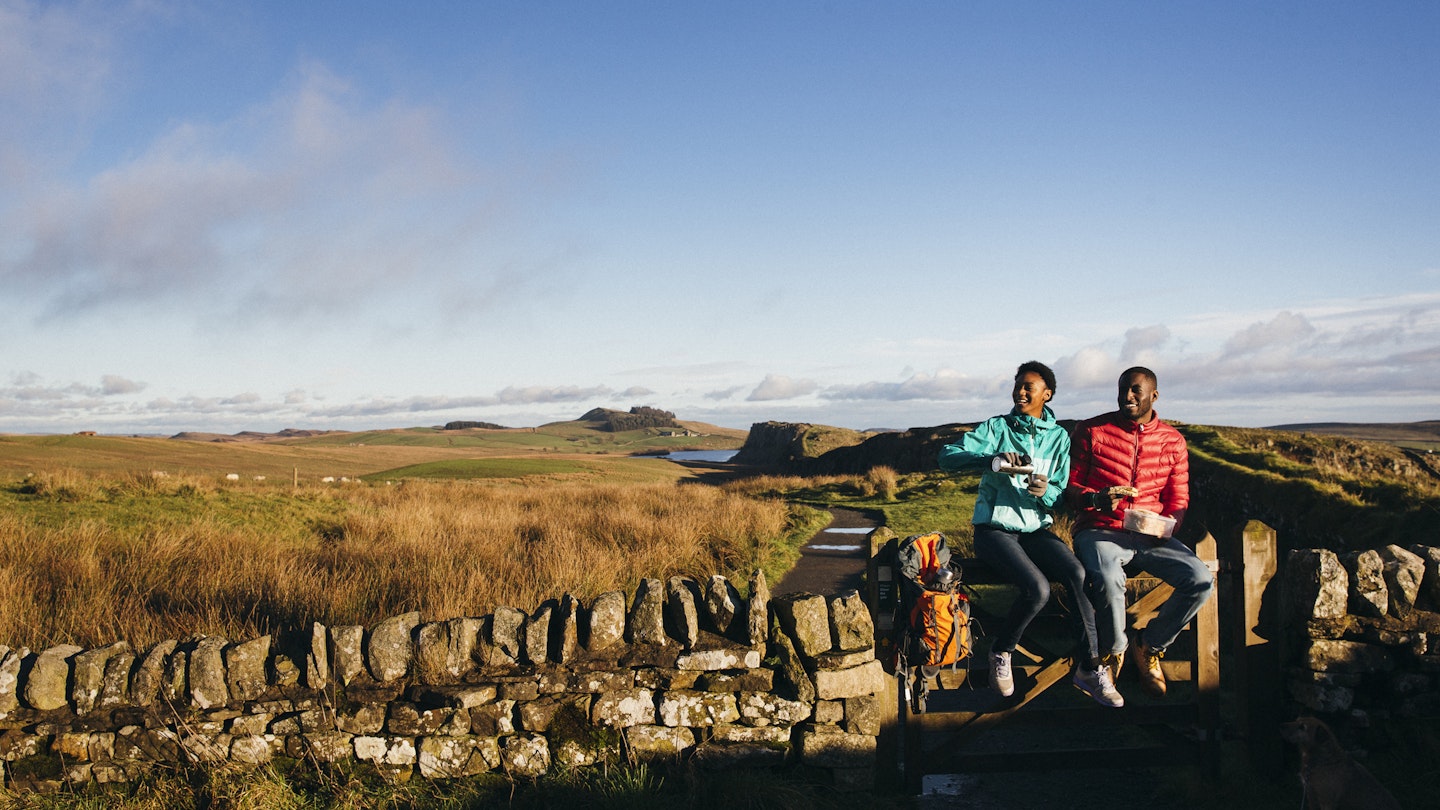With stunning chalk cliffs, ancient woodland, misty moorland, glorious lakes, and rolling green fields, England has a lot of scenery to offer, with plenty of space to clear our minds, breathe, and reconnect. Some of the best countryside falls into designated national parks that are packed with opportunities to climb, hike, ride, and bike.
From stargazing beyond our stratosphere to simply surrounding yourself with the sounds of nature, here’s what you can expect from each of England’s 10 national parks, starting with the most northerly and heading south.
Northumberland: Historic Sites and Incredible Stargazing Opportunities
Northumberland is the least populated of England’s national parks, covering a vast 405 sq miles. Choose a hiking route to meet your fitness level and keep an eye out in the woodland – this is one of the few places in England where you can still spot red squirrels. A section of UNESCO heritage listed Hadrian’s Wall – the Roman wall running coast-to-coast – goes through the south of the park.
Take a glimpse at “some of the darkest skies in the world” at Kielder Observatory, which is open year-round for a chance to spot the Milky Way and other astronomical wonders. This park is one of the last true wildernesses in England. The best times to visit are April to May, where you’re sure to see lambs, or in August when the moors turn purple with flowering heather.

The Lake District: Ideal for Hiking and Water Sports
One of Britain’s most visited national parks, the Lake District is known for wonderful hill walks and water-based activities. Whether you want to go boating, paddleboarding, kayaking, or fishing, there are plenty of opportunities at the lakes, tarns, and coastline here.
Add a whole bunch of inventive restaurants along with some lovely day spas overlooking Windermere, and it can be hard to leave. The towns get crowded in summer, so if you’re not concerned about the water being that bit colder, the best time to visit is in the fall when it’s less busy and the autumn colors are starting to shine.

North York Moors: Incredible Atmospheric Views
North York Moors is made up of windswept moorland, dales (valleys), and coast, particularly beautiful in August to September when the heather blooms. Most of the moorland is open access land, meaning you can roam away from the paths. It’s best explored by car – you’ll drive ridgetop roads above lush green valleys.
The Yorkshire Dales: Loved by Hikers Looking for a Challenge
The Yorkshire Dales is one of England’s best hiking and cycling areas. There are hundreds of miles of trails lined with drystone walls that lead through scenic valleys and picture-postcard villages. The Dales host the popular Yorkshire Three Peaks Challenge, which covers 24 miles and includes all three peaks, to be completed within 12 hours.

The Peak District: The Best National Park for Climbers and Cavers
England’s first national park, the glorious Peak District, is the southernmost point of the Pennines and a popular day trip from Manchester. It features hills, valleys, moorland, and escarpments, perfect for climbing and caving. Follow walking routes to better understand the landscape and look out for the iconic Dartmoor ponies grazing.
The Broads: Boating and Bird-Watching
The Broads is a protected wetland made up of shallow lakes, coastline, and navigable windmill-lined waterways. This area is teeming with wildlife, making it a paradise for keen bird-watchers and nature enthusiasts alike.

South Downs: A Long-Distance Hiking Route
The South Downs offers expansive countryside shaped by centuries of farming. Take car-free trails, bridleways, or paths for stunning views, especially along the South Downs Way, a 100-mile-long route along the chalk and flint ridge. This area is perfect for exploring, especially from May to October.
The New Forest: Wildlife Encounters
The New Forest is packed with heathland, woodland, bogs, farmland, and coastal areas, featuring historic sites with walking and cycling trails. Expect to see ponies and cattle roaming free as they are an integral part of this environment.
Exmoor: Europe’s First Dark Sky Reserve
Exmoor offers a varied landscape ideal for outdoor activities such as mountain biking, with stunning views of its natural beauty. As a designated Dark Sky Reserve, it is perfect for stargazing enthusiasts looking to explore the quiet night skies.
Dartmoor: Best for Wild Camping
Dartmoor’s vast moorland and dramatic granite tors provide an enticing atmosphere for camping and outdoor activities. With a mix of hiking, cycling, riding, and climbing, it’s ideal for adventurers who appreciate nature’s ruggedness.




